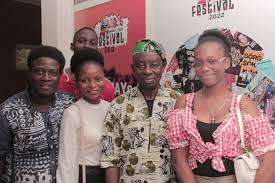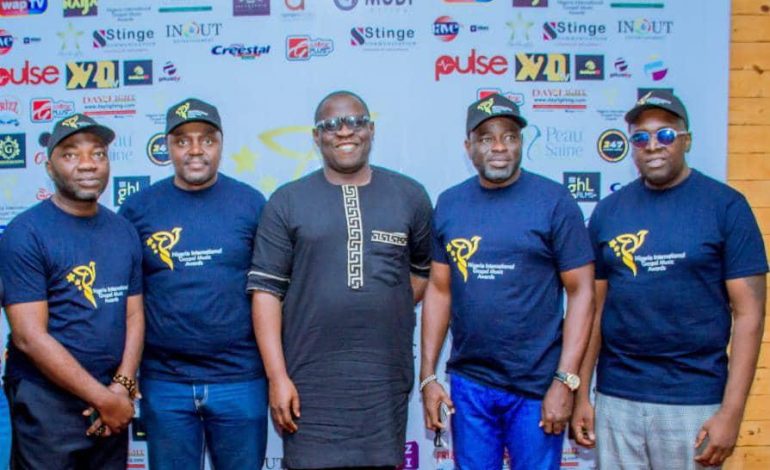Government must identify creative industry as next ‘oil’ and treat it as such, says Uphopho

‘We need to control our own data and projections we intend to achieve through research’
‘Culture ministry should strategically work with private sector practitioners’
Vibrant and focused in raising the bar in the creative sector, Kenneth Uphopho is breaking barriers and leading an army of youths to their creative destination. From being the pioneer director of Lagos Theatre Festival (LTF), instituted by the British Council Nigeria, to giving fillip to Nigeria’s vibrant performance spaces and instituting Lagos and Abuja Fringe festivals, Uphopho continues to raise the Nigerian flag aloft both at home and abroad. He recently returned from Brighton Fringe Festival, UK, where his play, Esther’s Revenge got accolades, just as he’s preparing for Lagos fringe in November. An exuberant Greece Embassy staff denied him the opportunity to attend a mentoring programme in Greece where he was billed to impart open-access training models to young culture enthusiasts from all over the world. In this interview, Uphopho sets before President Bola Tinubu’s administration a creative industry agenda
By Anote Ajeluorou
What would you want the Bola Tinubu’s administration to do for the arts and culture sector?
I’M Kenneth Uphopho, an artist and arts manager, working for better programmes and management for the creative industry across a range of areas, including exhibitions, cultural exchanges, mentorship, funding, skills development, and collaborative work. I have worked in the creative sector for years where competition for jobs and fresh graduate scheme opportunities are relatively low. So, self-employment always seems like a viable option, same thing as freelancing. We need to grow a community of artists and creative businesses.
Through the platforms we have created over the years, we accelerate and support creative start-ups. By doing that, we always encourage a sense of ownership and community. There is a quote recently that says, “Nigeria’s foremost career platform, Jobberman, in a 2021 report on the nation’s creative industry, positioned the (creative) industry as the country’s second-largest employer with the potential to produce 2.7 million jobs by 2025,” ThisDay newspapers 2023.

Founders of Lagos/Abuja Fringes, Brenda and Kenneth Uphopho
Our expectations from the new administration, such as we have expected from previous ones, will be to step in from time to time to provide support through infrastructure, grants, introduce study tours to the sector for privately run creative start-ups, workshops and international creative industry-led networking opportunities to build more connections for practitioners.
Between infrastructure and grants, which is the most urgent need for the sector?
The infrastructure solutions should include funding for research and innovations, building hubs across the country for tech and creativity, developing shared spaces for exhibitions and talent development, plugging into existing platforms with funding support to boost creative enterprise solutions in capacity building and partnerships. It could also be loan schemes for small businesses and pipelines for distribution/access to markets. You see that research part, it is very crucial to the industry. We need to control our own data and the projections we intend to achieve.
As the pioneer festival director of Lagos Theatre Festival (LTF) in 2013, I was invited to a study tour of Edinburgh Fringe and again to the Brighton Fringe in 2015 to observe the festival models. These experiences supported the expansion of the LTF which has so far featured over 300 productions with at least 25 international showcases and collaborations, making it one of the largest performing arts festivals in Africa (as reported by AMEX Essentials).
In my opinion, I believe the new administration has its work cut out for it. Once it can identify the creative industry as the next ‘oil’ and start to treat it as such, then we will all be the better for it. The creative industry also needs a restructuring, just as they are trying to develop the petroleum industry with the right infrastructure and the right policies. We need a general overhaul of the Arts Councils – from federal to states and LGAs – in terms of approach and branding. The Arts Councils should be empowered more with funds and the right strategy in place to disburse and support creatives across board to achieve common goals. Arts Councils in England support creatives with grants; here, they only dance for government officials. That’s a no-no!
The creative sector, as it stands in my opinion, is very private-sector driven, at least by 75 percent, if not more. What we need is for more government participation in creating an enabling environment for more opportunities to flow. We have to remember also that the creative industry is not an isolated one. Everything that affects the economy affects the creative sector. We were on a steady rise before Covid-19 happened. I believe we were steadily becoming vibrant again but the present economic realities are frustrating those effort. In the next four years though, I believe that we will develop more capacity for individuals who will lead the sector to the Promised Land. There are so many conversations ongoing around crossover engagements in the sector. How tech can enhance film, music, fashion, tv, dance, etc and vice versa. I believe that these conversations will become realities for the sector in the nearest future.
There is no gainsaying that grants have supported the industry over the years through artists and creative mobility grants, curation, creative development and exchange programmes. I have benefited from grants to develop my skills and work through workshops, study tours and even to develop my work on the field as a consultant/festival manager. Grants have helped me to build my body of work as well as putting together a creative portfolio with practical roles in the creative industry.
Over the years, my practice has evolved to include the development of non–theatrical, repurposed, and unconventional spaces to increase the reach of artistes with limited access to audiences and exhibition opportunities through the Lagos Fringe and Abuja Fringe festivals that I founded as well as devising new work with Women in the Arts for Advocacy. These not-for-profit showcase platforms have been supported by institutions and individuals because they believe in the industry and the power of the collective. That is why they have always supported.
Only recently, my play entitled Esther’s Revenge was supported under a cultural exchange programme. The play, which had previously been featured at arts festivals in Nigeria and South Africa, was supported to go for a showcase at the Brighton Fringe 2023. The play first won the Brighton Fringe International Bursary in Association with the Pebble Trust and has gone on to win The Brighton International Fringe Encore Award, sponsored by Soho Playhouse NYC, as a result of its critical acclaim. That is one of the benefits of grants’ funding.
So yes, grants provide a lot of support and the impactful stories over the years are through the roof but the sector cannot depend on grants (alone) to thrive in the long term. It is not a sustainable plan (model) to build a whole (arts) ecosystem on. There are many ways that the right infrastructure can develop the sector to foster both job and wealth creation and a whole competitive marketplace that even our international counterparts will be jostling to be a part of. Africa is the next big place, according to recent narratives, and Nigeria has to put the right infrastructure in place to compete on the global stage.
A Creative Industries Bill came late in the life of President Muhammadu Buhari’s administration and couldn’t scale through. Should that bill be reintroduced? What should the bill contain to assist the creative industry?
I remember being in one of the sessions that was curated for discourse on the Creative Industries Bill, but I never really had the opportunity to read the entire contents of the bill. Beyond regulation, it should contain plans for infrastructure and commissions that can bring more investments to the sector as well as opportunities for employment. I think the gesture of the previous administration was a step in the right direction. The most important thing to note is that a bill for the sector was even considered and written. I think it shows the intention of government and it would really be great to bring it back for review with all the stakeholders ably represented, so as to have a very robust bill for implementation. And that is another thing. You can have the bill but not get it implemented. I am very optimistic that this administration will follow through with the intentions of the past administration.

Kenneth Uphopho
What exactly should the ministry of arts, culture and tourism be doing for the sector? Is it doing enough, if at all, to assist the sector? Do you think the ministry has been too politicised? Who should head it?
I support the notion that the ministry of culture and tourism should be a stand-alone ministry. I think it is time we reverted to the times when we had a separate minister doing the work and canvassing for better policy for us in the sector. Let us all just agree that if there was more resources then the ministry would fare better. We should have an industry professional at the helms of affairs who truly understands the creative industries with the right support from government.
Our arts and culture is very exportable, so why are we not exploring that option? With the right synergy between the culture and tourism departments, with all our festivals, ceremonies and hospitality delights, government must engage with the creative industry at every level. From advertising, performing arts, film, TV, music, technology to visual art, there are so many ways that revenue can be generated for the government as long as it can position the sector at the level that it should be.
And we have the talent and the capacity for it. A few days ago, we heard our very own X3M Ideas, led by Steve Babaeko, broke a 70-year old record by winning a much coveted and well deserved award for Creativity in Advertising (Gold at the Luum Awards in Geneva, Switzerland). Shouldn’t that man and his company be celebrated like the Grammys winners? Truth is, the ministry should be strategically placed to work hand in hand with the private sector practitioners to better the industry for a fruitful experience for all.



